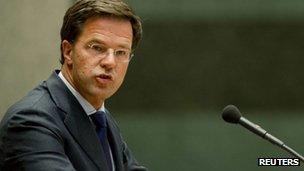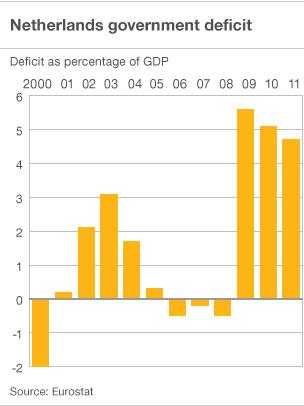Dutch crisis: PM Rutte appeals for responsible action
- Published

Mr Rutte warned MPs that "standing still" was not an option for the Netherlands
A day after the fall of his government, Dutch PM Mark Rutte has urged MPs to react "responsibly" to the serious economic problems facing the country.
His minority government collapsed over last-minute disagreements about finding billions of euros in austerity cuts.
"The economy is flagging, employment is under pressure and national debt grows faster than we can afford," he said.
He said he expected a general election to take place on 12 September, rather than before the summer recess.
"That does most justice to the differing views in the chamber," he said. A number of political parties have called for a snap election at the end of June but Mr Rutte said there was no majority for an earlier poll and the cabinet would make a final decision on Friday.
Despite fears of an impact on investors, the Netherlands raised 2bn euros at a bond auction on Tuesday.
The Dutch government had been looking to raise between 1.5 and 2.5bn euros (£2bn; $3.2bn).
It sold 1bn euros of a two-year bond with a 0.523% yield and, significantly, sold 995m euros of a 25-year bond at a yield of 2.782%, which is barely higher than Monday's rate.
One bond trader told ANP news agency the sale was "a good result in these circumstances".
When news of the government's imminent collapse emerged over the weekend, economists predicted that the cost of Dutch borrowing would rise and the country would lose its triple-A status, following in the footsteps of France and Austria.
One agency, Moody's, said on Monday night that the fall of the government was "a credit-negative" but added that the Netherlands had a stable outlook and was in "a position of relative strength".
'Henk and Ingrid'
The Netherlands has until 30 April to present the European Commission with a 2013 preliminary budget that will cut the country's projected budget deficit of 4.6% of GDP to within the EU's 3% limit.
Mr Rutte, in effect a caretaker prime minister since his resignation, told parliament that "standing still" was not an option for the Netherlands. He said he hoped that the political parties were ready "together with the cabinet to do what is necessary" to tackle the crisis.
He will now seek an agreement on holding the general election in September and on budget cuts of 16bn euros.
Since it came to office in October 2010, the minority government of Mr Rutte's liberal VVD party and the Christian Democrat CDA had been reliant on the support of Geert Wilders' Freedom Party (PVV).
When Mr Wilders walked out of vital budget talks on Saturday arguing that the proposals would harm pensioners and affect growth, the two coalition parties could no longer stay in power.
Mr Wilders told MPs on Tuesday that he regretted the collapse of budget talks, but said he could not sign up to a package that hit the typical Dutch household most of all.

"Either we opt for Henk and Ingrid, or we opt for the unelected eurocrats from the superstate that's called Brussels," he said.
He also objected to the idea of making "14 billion in cuts in one year while at the same time transferring billions to Europe".
Political commentators said that it would be impossible to reach a deal on austerity measures that would satisfy both the markets and Brussels unless all the centrist parties worked together.
One of the biggest dilemmas is for Labour party (PvDA) leader Diederik Samsom, commentators say, because he will have to decide between a compromise on cuts with Mark Rutte or confrontation, with a view to the forthcoming general election.